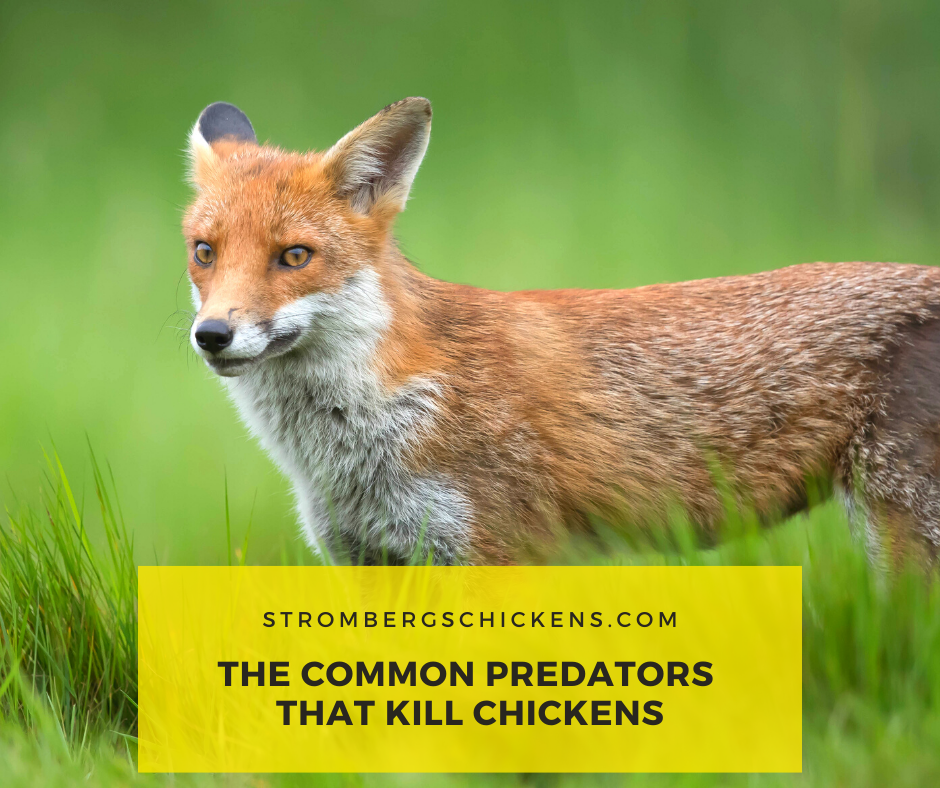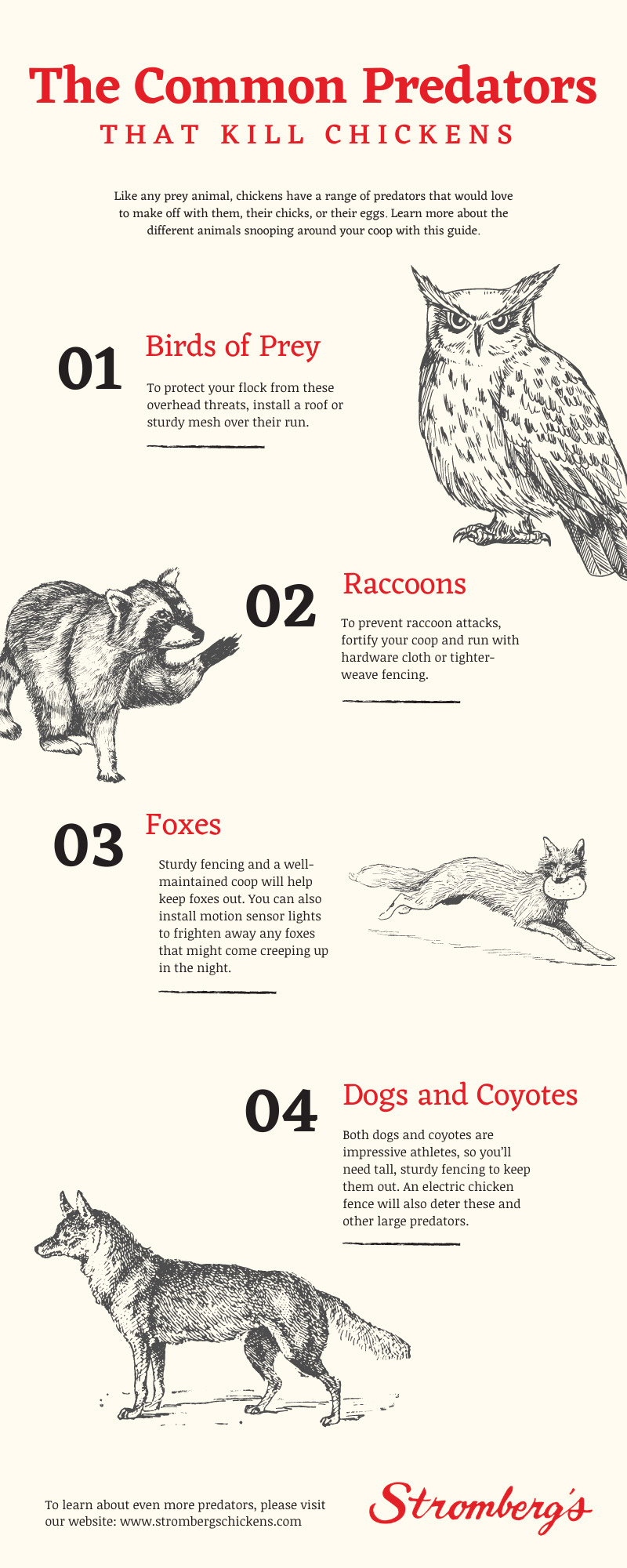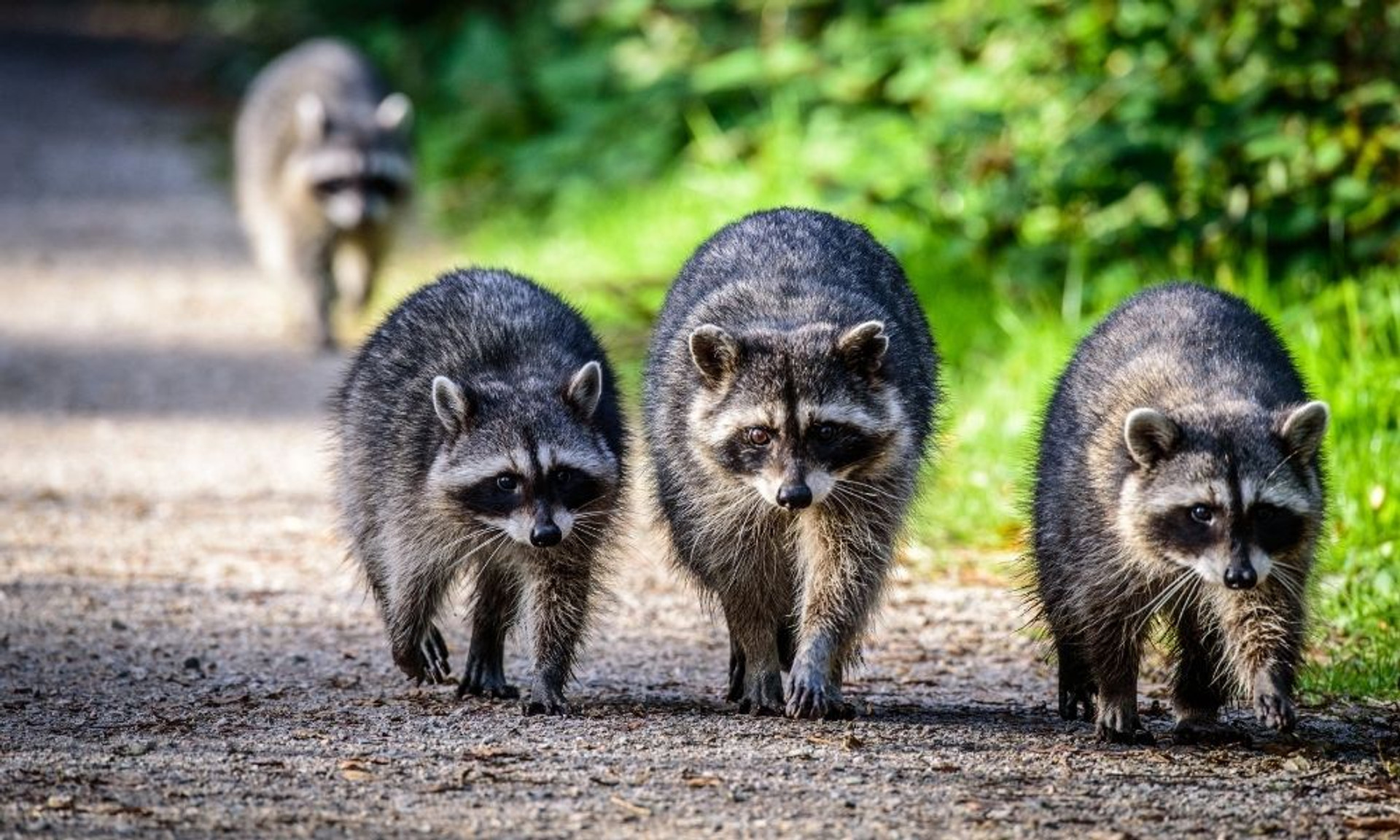The Common Predators that Kill Chickens
Like any prey animal, chickens have a range of predators that would love to make off with them, their baby chicks, or their eggs. Chicken keepers must stay vigilant against predators, both large and small. Whether it’s a hawk swooping overhead or a weasel burrowing beneath the fence, chicken predators have diverse and crafty ways to access backyard flocks.
Fortunately, you can take a few measures to keep out these threats. The more you know about the common predators that kill chickens, the easier it is to react to each threat accordingly.
Learn more about the different animals snooping around your chicken coop and tips for predator control supplies with this guide.

TYPES OF PREDATORS
Common chicken predators come in a variety of shapes and sizes. Even if your fencing and coop are secure, you might still deal with birds of prey attacking your chickens from above. That’s why learning about many different types of predators is important.
Research which animals exist in your local area and look for indicators such as footprints and hunting habits to determine which predators are wreaking havoc on your flock. Kick off your research with the following rundown of the most common predators that kill backyard chickens:
BIRDS OF PREY
Hawks, owls, and other raptors like to hunt chickens—especially when there are no humans, domestic dogs, or other threats around. Birds of prey rarely leave a trace of their hunt, making them trickier to spot than other predators. However, if you notice adult birds missing with no other explanation, there’s a good chance a hawk or owl made off with them.
Consider their hunting habits to determine what kind of raptor you’re up against. Hawks will strike during the day, while owls prefer hunting at night.
To protect your free-range chickens from these overhead threats, install a roof or sturdy netting over their run.
RACCOONS
Raccoons are clever animals with remarkable dexterity, making them formidable opponents compared to most predators. These crafty creatures can open simple latches or move objects around to get inside your chicken coop.
If that’s not irritating enough, they’re also wasteful when it comes to hunting. Forgotten carcasses are a tell-tale sign that a raccoon has been feasting on your flock—particularly if the body is missing a head or other limbs. This is because raccoons will reach through fencing to snatch a chicken and drag it out.
When the chicken’s entire body doesn’t fit through the fence, the raccoon will eat what it can reach and leave the rest. To prevent raccoon attacks, fortify your chicken coop and run with hardware cloth or tighter-weave fencing.
FOXES
Foxes have an unfortunately infamous love of chickens. Like birds of prey and other larger predators, foxes are strong enough to carry whole chickens out of the coop. If you awake to missing chickens but little other evidence, a fox might be the culprit.
If you look closely, you might find feathers after a fox attack. This is because foxes like to eat whole chickens, but the feathers are harder to swallow. Foxes will also eat eggs. If a fox has been after your eggs, you’ll likely find empty, broken shells in the chicken coop the next day.
Sturdy fencing and a well-maintained coop will help keep foxes out. You can also install motion sensor lights or an external electric fence to frighten away any foxes that might come creeping up in the night.
DOGS AND COYOTES
While the wild coyote might seem like an obvious threat to a backyard chicken keeper, you must also keep a watchful eye on man’s best friend: the domesticated dog. Both dogs and coyotes can and will carry off whole chickens without a trace.
Even if you know your dog is okay with chickens, the neighbor’s pup might turn out to be a menace if you’re not careful. Domesticated dogs often hunt for fun rather than for food. You might find the abandoned carcass near your coop if a dog is after your chickens.
If a coyote is the chicken thief, the carcass will be missing. Both dogs and coyotes are impressive athletes, so you’ll need tall, sturdy fencing to keep them out. An electric chicken fence will also deter predators.
CATS
Both domestic and wild cats pose a threat to chickens. Felines make sly and impressive hunters, so keep a watchful eye on any cats in your neighborhood.
Like foxes, cats will leave feathers behind because they can’t swallow them. Cats also often leave teeth marks on the bones they leave behind. House cats are smaller and will focus on hunting chicks.
Keep your eyes peeled for a guilty house cat nearby if you find chick wings and scattered feathers. Bobcats are larger predators that hunt during dawn and dusk. These cats are more likely to carry the entire chicken away, leaving nothing but a few stray feathers behind. Cats are agile creatures that can sneak through small openings.
To keep them at bay, make sure your coop is secure and free of any holes or openings.
SNAKES
Many people fear snakes for a variety of reasons. For a chicken keeper, that reason is their propensity to gobble up chicks and eggs. Snake attacks are difficult to spot because these reptiles tend to eat their prey whole.
If you realize you have missing eggs or chicks but no evidence as to what took them, it’s time to start looking out for snakes. Covering and repairing holes in the coop or fencing will help prevent snake casualties.
Keep in mind that snakes come in many different sizes. Smaller snakes will have an easier time slithering into the coop. Research the types of snakes in your area to get a good idea of what might be attacking your flock.
OPOSSUMS, SKUNKS, AND RATS
These predators are nest stealers. Their small size prevents them from attacking adult birds, so they prefer eggs and chicks. Rats can either steal eggs, feast on them in the coop and leave the shells behind.
Skunks and opossums, on the other hand, are messy eaters that will leave behind obvious signs of struggle. Because these animals are smaller, you must stay vigilant about gaps in your coop or fencing.
Skunks and rats can also burrow beneath a fence to get to their prey. Fortify your run by burying fencing several inches into the ground. This will deter rats, skunks, and other burrowing creatures.
WEASELS
Speaking of small, burrowing predators, the weasel is another significant threat to your flock. Despite their size, weasels can and do kill adult chickens. Weasels are quick, clever, and greedy predators.
Like raccoons, they’re often wasteful about their hunting. If you find a dead bird with lacerations or missing intestines, there’s a good chance a weasel is behind the attack. Due to their small size, weasels can fit through chicken wire or small gaps.
The best way to protect your chickens from these common chicken predators is to inspect your coop and run for these openings thoroughly. Hardware cloth or finer mesh fencing can help eliminate weasel entrances.
Every chicken keeper faces different predators. How do you deal with your local chicken hunters? Share your experiences and advice with us below.


